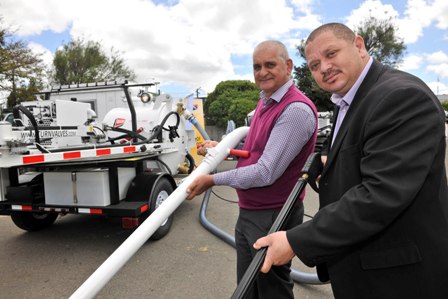Cape Town’s four new cutting-edge valve exercising machines is testament to the City’s commitment to efficiency through innovation and technology.
The use of this technology will lead to a more reliable water supply network, thus reducing inconvenience to residents and improving service delivery.
It will enable the Water and Sanitation Department to locate, identify, clean, exercise, and, where necessary, repair or replace valves. This will maximise the life of the infrastructure and save the City millions of Rands as a pipe burst prevention measure and, at times, as a reactive measure.
It will thus also ensure a more reliable water network, reducing inconvenience to residents.
The City has saved approximately R350 000 in one severe pipe burst incident already by using this technology.
In the previous financial year, the City recorded over 3 300 pipe bursts. On average the cost of repairs on a pipe burst is R25 000, however, the cost does vary dependent on pipe location, depth and size.
The City has approximately 175 000 valves in its water network. These valves are used to isolate parts of the system allowing for construction, maintenance or repairs to be done.
The valves are usually used infrequently to regulate, stop and start the flow of water. However, when required, they must be able to function without fail.
As a result of their infrequent use, valves tend to seize up, making them difficult to operate when their use is critically important. The City has had to replace a number of these valves in the past, thus the machinery will ease the difficulty associated with a number of these replacements.
Due to their diameter being only approximately 10cm they are also difficult to locate, especially at night time or in bad weather conditions. Every valve will now have a GPS location. It is hoped that the use of the GPS technology will help to alleviate this particular challenge.
PHOTO CREDIT: Bruce Sutherland
via Cape Town Green Map.






